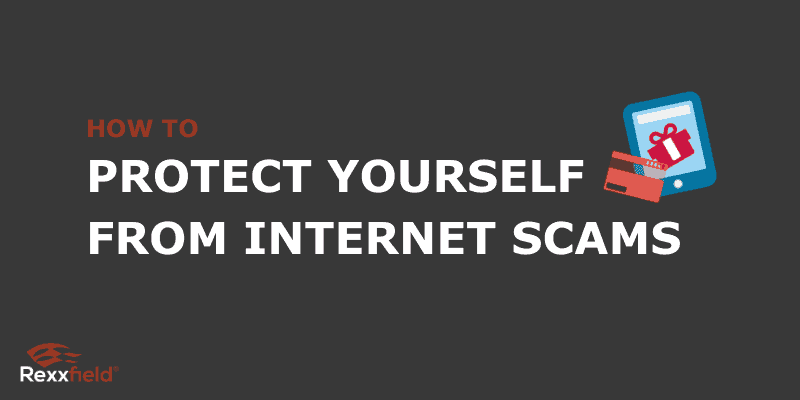Scammers are quite innovative in their initiatives to obtain your money or private details. Watch and protect yourself from internet scams by utilizing our guidelines.
Ways to protect yourself from internet scams:
Be alert. When dealing with unidentified contacts from people or businesses, always take into account the chance that you may be contacted by a scammer. Whether the communication is over the phone, article, email, face to face, or on a social networking site, if it looks too good to be true, it most likely is.
Know who you’re talking to. If you have contacted a person online or are not sure of the legitimacy of the service, do your research. Perform a Google image search on photos or browse the internet for others who might have ventured with them. If a message or email originates from an acquaintance, and it appears uncommon or out of character for them, contact your good friend right away to examine if it was indeed them who sent it.
Do not open questionable messages such as pop-up windows or click links or attachments in emails. If uncertain that something is trustworthy, validate the call via an independent resource such as a phone book or online research. Do not use the call details provided in the message sent to you. It is most likely a spoofed phone number.
Hang up on phone calls where your computer system asks for remote access even if they speak of a well-known Telecommunications provider. Scammers will frequently ask you to switch on your PC to repair an issue or set up a cost-free upgrade. By doing so, they install a virus on your device, which gives them your security passwords, personal details, and more.
Keep your personal details safe. Shred your bills and various other important files prior to throwing them out. Keep your passwords and PINs in a safe and secure location. We recommend 1Password, where you can safely store all details on any device. Be conscious of how much personal data you share on social networks. Scammers can use your details and photos to produce a phoney identity or to target you with an internet scam.
Always keep your mobile phones and computer systems safe and secure and use password protection. Never share access with others, (definitely not remotely). Update security programs and back up your product.
Shield your WiFi with a password and stop using public computers or WiFi hotspots for electronic banking or supplying personal data.
Select your passwords thoroughly. Choose passwords that would be tested for other individuals to think about and change them regularly. A useful password ought to include a mix of upper and lower-case letters, numbers, and signs. Don’t use the same password for different accounts/profiles, and don’t share your passwords with anyone else.
Review your privacy and security settings on social media. If you use social networks, such as Facebook, beware of who you connect with. Learn just which privacy and security settings to use to remain safe. If you see suspicious behaviour, click spam, or are scammed online, take action to safeguard your account and report the cybercrime.
Beware of any inquiries for your personal details or money. Never send out cash or supply online account information, bank card information, or copies of personal files to somebody you don’t recognize or trust. Don’t consent to transfer money or products for someone else: money laundering is a criminal offence.
Be wary of uncommon payment requests. Scammers will typically ask you to make use of an uncommon repayment technique. These payment methods are often preloaded debit cards, gift cards, iTunes cards, or virtual money such as Bitcoin.
Beware when shopping on the internet. Online retail scams are very common. Stay clear of deals that appear too good to be real. Always deal with an online purchasing platform that you know and trust. Reconsider before using virtual currencies (like Bitcoin). They do not have the same safeguards as various other deal solutions, which means you can’t obtain your money back once you send it.
How to recognize Internet scams
Indicators of a fake document
Documents are easily forged. Some may look just like the genuine thing. Nevertheless, several may have warning signs, such as:
- Generic greetings instead of an individual greeting.
- Company names that don’t exist.
- Low-quality look.
- Low-quality grammar and spelling.
- Exceptionally formal or pressured language.
Files like trip plans and bank statements have basic, problem-free layouts. These layouts are basic because such services enable their customers to print online records. For scammers, it’s effortless to create phony papers by using data available online such as company logo designs and graphics from sites.
How to recognize a scam email
Scammers can conveniently fake an official-looking email, working with the very same logo design and format as the genuine business.
Commonly your guard is down when you acquire an email from a company you have dealt with before, like an online retail website you sometimes use. If you’re not anticipating an email, always check if it’s fake before clicking any links or opening any attachments.
How to tell if a dating profile is fake
Romance scams are one of the most well-known internet scams. When having a look at a brand-new dating profile, watch for anything irregular concerning their selection of:
- Profile picture– Scammers frequently utilize fake photos they’ve located online.
- Area.
- Passions.
- Does the language match their profile?
Tip: Do a photo search of the individual to find out if they are who they claim they are. You can use reverse image search services on Google.
How an online dating scam works



Trackbacks/Pingbacks